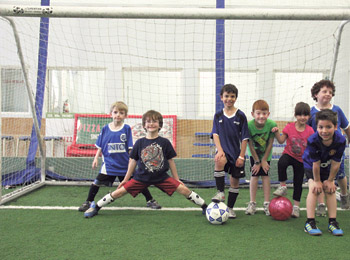Beit Issie Shapiro (BIS), an Israeli organization that’s a leader in the field of disabilities, is starting to partner with local companies to spread its innovative programs and services across Canada.
The non-profit agency has an appointed Special Consultative Status to the UN’s Economic and Social Council. This allows BIS to share its work and innovations with other countries and help people with intellectual and physical disabilities worldwide.
“We’re looking at Beit Issie as a light unto the nations,” says Gilad Epstein, president of the Canadian Friends of Beit Issie Shapiro (CFOBIS). “We want to encourage the innovation coming out of Israel and bring it to the Canadian community.”
Among these services is an inclusive, fully accessible playground that CFOBIS is trying to bring to Canada. In Israel, it’s called Park Chaverim and allows kids with and without disabilities the chance to interact on the same playground.
By bringing together kids at these parks, those who are disabled and have special needs can further integrate into society.
“Using a playground as a platform so that children with and without disabilities can play together is empowering for families,” says Benjy Maor, Beit Issie Shapiro’s director of international resource development.
BIS’ latest innovations are apps for iPads and other touchscreen devices that kids with limited cognitive and motor skills can use.
The idea to develop these applications came from a group of Israeli parents with disabled children. They explained to the heads of BIS that their kids had picked up their iPads and were figuring out how to open and close the apps on their own.
Instead of developing apps, Beit Issie Shapiro spoke with web developers to find which ones they could adapt to work better for children with disabilities, Maor says.
The goal is to make these kids’ lives, as well as their family’s lives, easier.
These games help children improve their cognitive and motor abilities, as well as their self-esteem.
“The iPad has something about it that elicits motivation of these kids,” Maor says. “We had one girl who was not using her right hand. Through game playing with her therapist, with the iPad, she now uses her right hand.”
BIS is also developing accessories to assist kids who are unable to hold or swipe the iPad, ensuring that more can benefit from these apps and games.
For instance, it’s working on developing waterproof iPads. Some children with disabilities interact better in the water, Epstein says. They can play these games during hydra-therapy treatment, in an environment that suits them better.
“For me, Beit Issie represents Israel at its best: innovative, inclusive, dynamic, entrepreneurial,” Epstein says.
CFOBIS has been involved with the non-profit agency for 20 years. For much of that time, the group has fundraised for BIS. Now, Epstein says he wants to foster more collaboration with companies in Canada so that ideas and innovations from Israel can have a tangible impact here.
On April 27, CFOBIS will host its fourth annual Soccerthon, a family charity event at the Trio Sportsplex in Woodbridge, Ont., that raises funds and awareness for the Israeli non-profit.
Last year’s Soccerthon raised $15,000. This year’s theme is, appropriately for 2014, the World Cup. Teams that sign up select a nation they will represent and each has a target fundraising goal of $1,000, Epstein says.
The money CFOBIS raises helps children with disabilities in Israel, as well as other countries that BIS shares its knowledge and innovation with – including Canada.
BIS helps some 30,000 children and adults in Israel every year. It is a world leader in Snoezelen (multi-sensory) therapy to help kids with intense sensory difficulties. It’s also the first organization in the world to develop a higher education program for young adults with learning disabilities, in conjunction with Bar-Ilan University.
The non-profit also benefits Israel’s Arab community. BIS works with imams and teaches them how the Muslim value system should support and help people in their congregations who have disabilities, Maor says.
